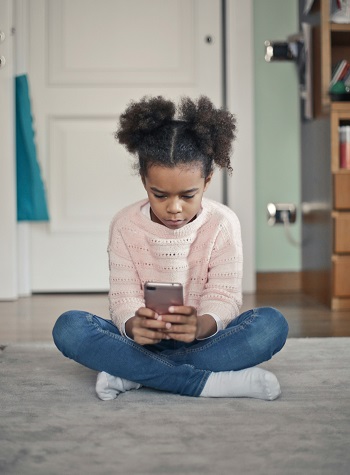Mental Health and Early Smartphone Exposure
I think that there are many parallels to be drawn from the revolution in the way we eat, to the advent of smart technologies on the health of our young people. I do not mean to exclude adults from this assertion, but I am concerned with the education of young children, and this is where my focus lies.
Those of us old enough to remember the 70s and 80s will recall the time when ‘fast food’ emerged in the US with the expansion of McDonalds and thereafter swept the world. More commonly referred to as ultra-processed food nowadays, we now have a much greater understanding of the science which has proven that the consumption of these products is associated with a higher risk of succumbing to many diseases. Dense with calories, convenient to use, highly palatable and perniciously addictive, we are all familiar with the temptation to eat these items and the consequential accelerating rates of obesity in the developed world. Furthermore, these products are manufactured by enormous organisations with an eye on profitability more than ‘genuine’ health and well-being. I use the word ‘genuine’ because some of the so called ‘health foods’ advertised ubiquitously, are amongst the worst offenders.
The advent of Smart technologies has, since its inception, been peddled by large corporations as super helpful, convenient and intuitively easy to use. We have been told that they can help us become more creative, smarter and faster. Tapping into our primitive brains and activating the dopamine system, the millions of applications and social media platforms at our disposal have created a compulsion which is very hard to resist, not unlike that triggered by ultra-processed food.
In today’s hyper-connected world, it is hard to imagine a life without smartphones and they are not going to go away. These devices have revolutionized the way we communicate, learn, and engage with the world.  However, as parents, and educators, we must seriously consider the impact of early smartphone exposure on the mental health of young people. With growing research into the developmental and psychological effects of screen time, we are gaining insights into how early and excessive use of smartphones can influence the well-being of children as they approach adolescence. Understanding this impact is critical if we are to foster environments that promote healthy development.
However, as parents, and educators, we must seriously consider the impact of early smartphone exposure on the mental health of young people. With growing research into the developmental and psychological effects of screen time, we are gaining insights into how early and excessive use of smartphones can influence the well-being of children as they approach adolescence. Understanding this impact is critical if we are to foster environments that promote healthy development.
The Rising Tide of Smartphone Use
It is not uncommon to see toddlers swiping through screens or staring at YouTube. This trend raises important questions about the long-term consequences for mental health, especially as children grow into adolescence, a period marked by significant emotional and psychological development.
A growing body of research indicates that the use of smartphones in early childhood can have a detrimental impact on mental well-being. These effects can manifest in a number of ways from increased anxiety and depression to difficulties in attention, self-regulation, and sleep patterns. The relationship between early smartphone exposure and these challenges is complex, often involving a range of social, emotional, and neurological factors.
Developmental Challenges and Emotional Regulation
One of the most concerning aspects of early smartphone exposure is its impact on emotional regulation. Emotional regulation is the ability to manage and respond to emotional experiences in an appropriate and balanced manner. This skill is critical for healthy interpersonal relationships and overall mental health. The area of the brain, which governs decision-making, impulse control, and emotional regulation, is still developing throughout childhood and adolescence.
When young children spend excessive time interacting with digital devices, they may become reliant on external stimuli for distraction or emotional comfort. Instead of learning how to manage emotions through interaction with caregivers, peers, or through self-reflection, they may turn to a device for instant gratification or escape.
Social Skills and Interpersonal Relationships
Another critical aspect of early development is the formation of social skills. Much of a child’s ability to engage with others, develop empathy, and build meaningful relationships is learned through face-to-face interactions with family, peers, and caregivers. When children spend too much time in front of screens, particularly smartphones, they miss out on these crucial social experiences. This can hinder their ability to form close relationships and engage in cooperative play, both of which are essential for healthy social development.

Anxiety, Depression, and the “Comparison Trap”
As children grow older and become more active on social media, the risks associated with early smartphone exposure evolve. Adolescents are particularly vulnerable to the negative effects of social media. These platforms often present an idealised version of life, where users showcase their best moments, achievements, and appearances. For young people, this can lead to feelings of inadequacy, anxiety, and low self-esteem as they compare their own lives to the seemingly perfect lives of others. Indeed, this aspect of social media disproportionately affects girls, who spend more time than their male peers using these platforms.
Striking a Balance: The Role of Schools and Families
While it is clear that early and excessive smartphone use can have detrimental effects on the mental health of young people, it is important to recognise that technology itself is not inherently harmful. Smartphones offer numerous educational benefits, providing access to information, fostering creativity, and facilitating communication. The key is finding a balance between healthy screen time and opportunities for real-world interaction, physical activity, and unstructured play.
At Manchester High School for Girls, we fully support the principles of the Smartphone Free Childhood Movement, which recommends delaying smartphone use, or at the very least, limiting exposure until the age of 14. Mobile phones of any sort are not permitted in the Preparatory Department, but for those girls who need to be contacted while travelling, we advocate the use of ‘brick phones’ as a safer alternative. Recently, we were privileged to host Dr. Susie Davies, founder of PAPAYA (Parents Against Phone Addiction in Young Adolescents), who conducted informative workshops with our Years 5 and 6 students. Her visit culminated in a valuable evening presentation for parents, addressing the risks of phone addiction and offering practical strategies to manage it.
Fundamentally, we have a responsibility as educators to help prepare our pupils for their future world and ensuring that they have the life skills needed to interact positively with those around them and to avoid unhealthy habits lie at the heart of a truly holistic education.







Interesting article – it is such a shame how technology has taken over the world in recent years.
I think Kids shouldn’t have phones till their in their teens
If children have phones,i believe they should have time limits on it,plus no way to get on the internet with it
smart phones bring an additional pressure that little kids just don’t need